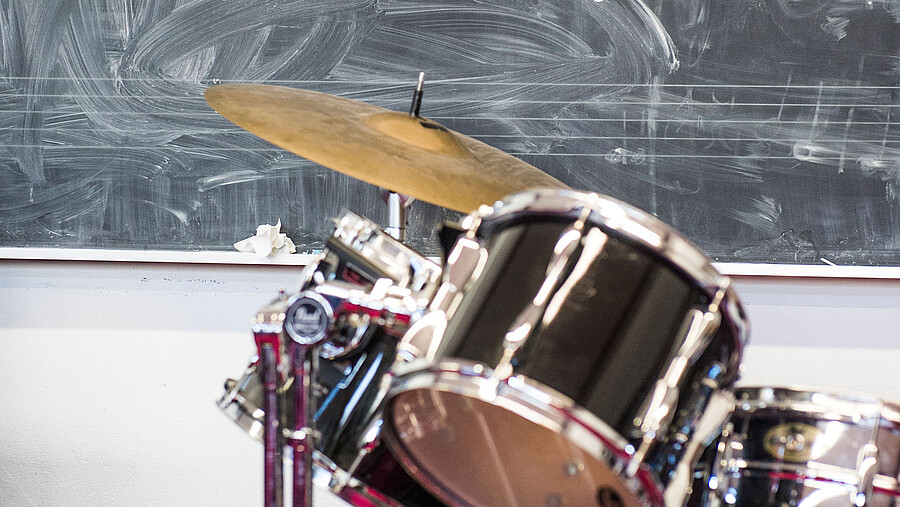Music as subject in the Bachelor's degree programme in Special Needs Education
(Bachelor of Arts)
Profile
German HZB: none
International application: German C1
Find out more
- The proof of a special educational internship or equivalent practical work in educational work with people with disadvantages or disabilities (compulsory)
- Aptitude test procedure
Stay abroad possible, but not obligatory.
Short Description
Music is offered as a second subject (or supplementary teaching subject) within the bachelor's programme Special Needs Education. As first subject Special Needs Education is studied. The first two semesters are reserved for the contents of the first subject. The courses of the second subject will be added by the third semester.
The subject music is not studied at Leibniz University Hannover, but at the University of Music, Drama and Media Hanover (HMTMH).
As part of the bachelor's programme, the subject Music offers distinct musical practice components (instrumental or vocal lessons, piano accompaniment, guitar and organ instruments, free forms of improvisation, etc.) as well as special-education components (elementary or class music, rhythmics, vocal and choral conducting, application of digital music media) and music-theoretical learning components (general music theory, ear training, overview of music history).
Further information on the website of the University of Music, Drama and Media Hannover
Course Content
- Historical Musicology and Elementary Music Education
- Artistic subjects (instrument and vocals)
- Music education
The bachelor's degree programme in Special Needs Education begins with the first (major) subject at the Leibniz University Hannover. Starting in the third semester, the study of music as a second (minor) subject begins at the HMTMH. Therefore, the enrollment for the first semester takes place at Leibniz University Hannover.
The course contents are evenly distributed to the individual semesters in the bachelor phase and often designed to build on each other. This concerns the practical fields of instrumental and vocal lessons as well as the areas of music theory and ear training, song accompaniment and improvisation. But there are also courses that are completed after one semester, such as rhythmics, sing-along, class music, music history and introduction to music education.
- Specialized practical skills in the field of instrumental playing and singing voice
- Prelude on an instrument (musical creativity - genre-independent)
- Auditions (intonation, tonal and musical creativity - also genre-independent)
- Hearing skills (distinction of intervals, triads, rhythms, etc.)
- Basic musical knowledge in the field of music theory and music history
- Music educational awareness or previous experience in the field of music education
The second subject music specifically is designed for work areas in inclusive schools, elementary music education and the individual special educational areas of language, learning, emotional, social and mental development.
Work opportunities apart from schools are in the field of educational cooperation in protective workshops and other facilities for the disabled. Based on this programme, specializations in the fields of music geragogy or music therapy can be acquired.
Admission Requirements
The Bachelor’s degree programme in special needs education generally is admission restricted.
As second subject some subjects in the Bachelor’s degree programme in special needs education are restricted (Applied Linguistics (non-school-based), German Studies (school subject: German), History, Arts, Music, Social Studies and Science ("Sachkunde") and Sports (school subject: Physical Education) and others are admission-free (Protestant Theology (school subject: Protestant Religious Education), Catholic Theology (school subject: Catholic Religious Education) and Mathematics).
The exact admission requirements can be found in the admission regulations and on the Website of the University of Music, Drama and Media Hanover (HMTMH):
Application Deadlines
1 June - 15 July of the year for the winter semester
- First-year students (application for the 1st semester) can only apply for the winter semester.
- Those continuing their studies (application for higher semesters) can also apply for the summer semester (1 December - 15 January.
The following applies to applications from non-EU countries:
- VPD from uni-assist OR a passed assessment test (Feststellungsprüfung) of a preparatory foundation course (Studienkolleg) is required.
- Applications for the Studienkolleg must be submitted by 15 July.
Leibniz UNInsights – The student podcast
Please note that activating the video will result in the transfer of data to the respective provider. Further information can be found in our privacy policy.
Play video
Do you have questions about studying? We are happy to help!

30167 Hannover

30167 Hannover









